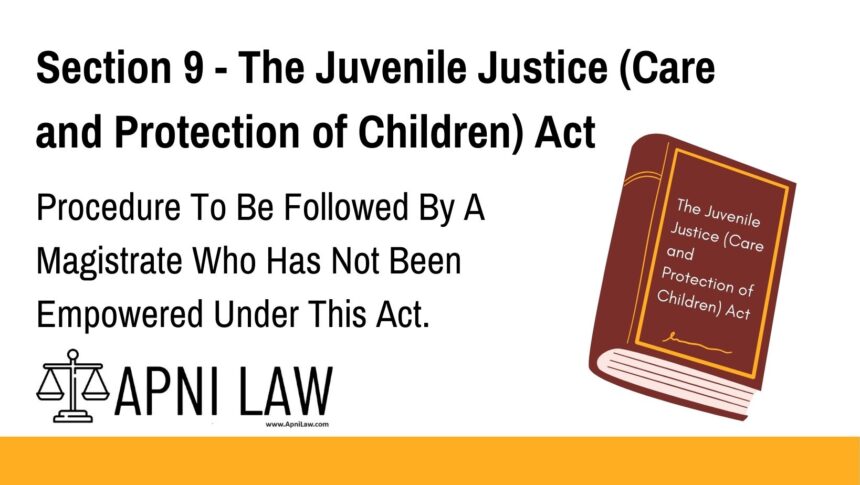Code
(1) When a Magistrate, not empowered to exercise the powers of the Board under this Act, is of the opinion that the person alleged to have committed the offence and brought before him is a child, he shall, without any delay, record such opinion and forward the child immediately along with the record of such proceedings to the Board having jurisdiction.
(2) In case a person alleged to have committed an offence claims before a court other than a Board, that the person is a child or was a child on the date of commission of the offence, or if the court itself is of the opinion that the person was a child on the date of commission of the offence, the said court shall make an inquiry, take such evidence as may be necessary (but not an affidavit) to determine the age of such person, and shall record a finding on the matter, stating the age of the person as nearly as may be:
Provided that such a claim may be raised before any court and it shall be recognised at any stage, even after final disposal of the case, and such a claim shall be determined in accordance with the provisions contained in this Act and the rules made thereunder even if the person has ceased to be a child on or before the date of commencement of this Act.
(3) If the court finds that a person has committed an offence and was a child on the date of commission of such offence, it shall forward the child to the Board for passing appropriate orders and the sentence, if any, passed by the court shall be deemed to have no effect.
(4) In case a person under this section is required to be kept in protective custody, while the person’s claim of being a child is being inquired into, such person may be placed, in the intervening period, in a place of safety.
Explanation
Key Provisions of Section 9:
-
Referral to the Board:
If a Magistrate, who does not have the authority to exercise the Board’s powers, believes that the accused is a child, they must promptly refer the matter to the Juvenile Justice Board for further handling. -
Determining Age:
-
If a person alleges to be a child (or was a child when the offence was committed), or if the court has doubts about the person’s age, the court must inquire into the matter.
-
Evidence (except affidavits) must be taken to determine the age of the accused. The court must record a finding regarding the age of the person, which will be taken into account while proceeding further.
-
Such a claim regarding the age can be raised at any stage of the case, even after the case has been disposed of, and must be decided according to the provisions of the Juvenile Justice Act.
-
-
Impact of Findings:
If the court concludes that the person was indeed a child at the time the offence was committed, the matter will be referred to the Juvenile Justice Board for appropriate action. The sentence passed by the regular court will have no effect in such cases. -
Protective Custody:
While the age claim is being inquired into, the person may be kept in protective custody in a place of safety. This ensures the well-being of the person until the matter is settled.
Common Questions and Answers
1. What happens if the court is unsure about the age of the person?
-
If there is any doubt about the person’s age, the court will conduct an inquiry to determine the person’s age. Evidence will be presented (except affidavits), and a finding will be made on the person’s age.
2. Can a claim of being a child be raised after the case is closed?
-
Yes, a claim of being a child can be raised at any stage of the case, even after the case has been finalized. The age claim will be examined according to the rules of the Juvenile Justice Act.
3. What happens if the court finds that the accused was a child at the time of the offence?
-
If the court concludes that the accused was a child when the offence occurred, the case is referred to the Juvenile Justice Board for appropriate orders. Any sentence passed by the court will be considered invalid.
4. Where will a person be kept during the age inquiry?
-
While the inquiry into the person’s age is being conducted, the person may be kept in a place of safety to ensure they are treated according to the provisions of the Act.
Conclusion
Section 9 of the Juvenile Justice Act ensures that any person alleged to have committed an offence, who claims to be a child or is found to be a child, is treated accordingly by the Juvenile Justice Board. The section establishes a procedure for determining the age of the person involved and provides for their protection during the age inquiry. The Magistrate plays a vital role in referring the case to the Board if they believe the accused is a child. Furthermore, the section emphasizes the importance of child-friendly procedures and ensures that if a person was a child at the time of committing an offence, the court’s sentence will have no effect, and the case will be handled by the Board.








